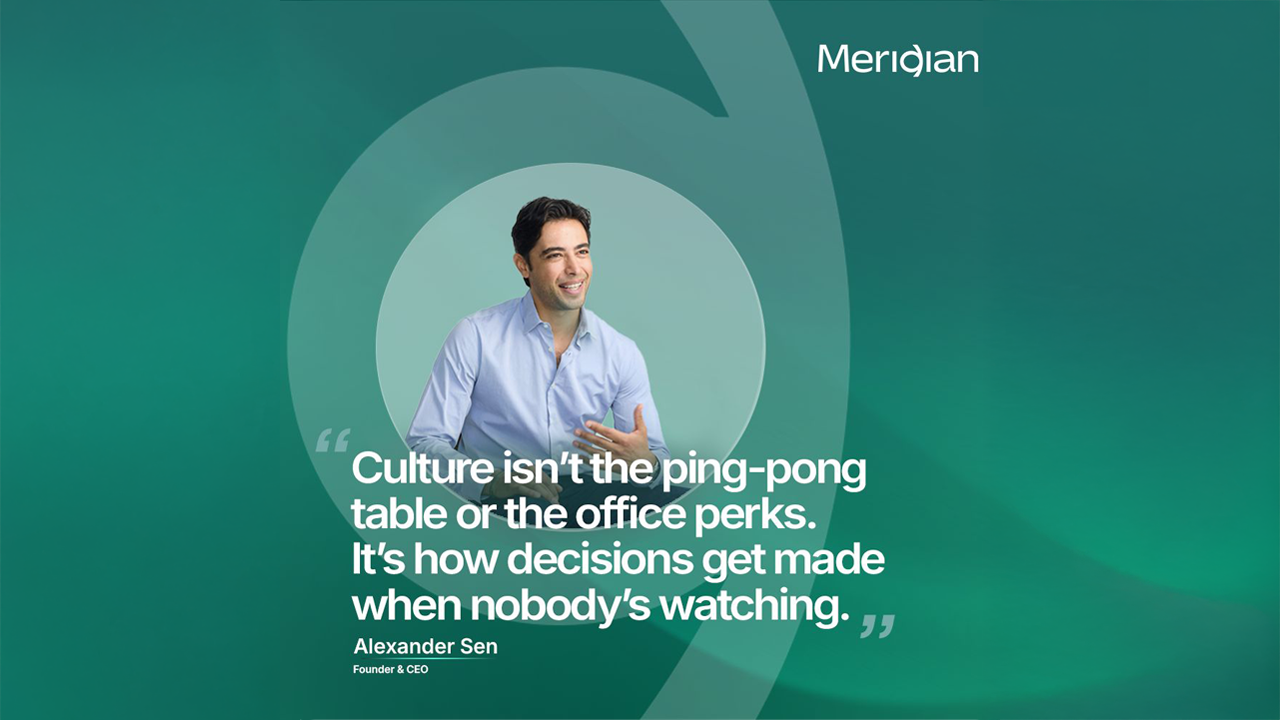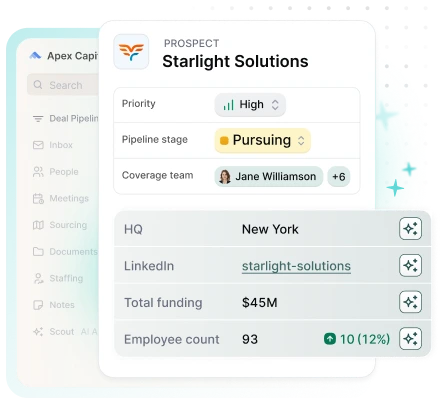Meridian raises $7M seed round led by 645 Ventures.
Read More
Discover why company culture goes beyond office perks to become your most powerful competitive advantage. Learn how founders can build cultures that compound success over time.

When entrepreneurs talk about building a company, they often focus on product-market fit, funding rounds, and growth metrics. But there's an invisible force that determines whether any of those efforts will succeed: company culture. And no, it's not about the ping-pong table in the break room or the kombucha on tap.
Culture is how decisions get made when nobody's watching. It's the unwritten operating system that runs your company when you're not in the room. After transitioning from private equity to founding my own company, I've learned that culture isn't just another item on the CEO's checklist—it's the foundation everything else builds upon.
In private equity, you inherit a system. The culture, for better or worse, already exists. You work within established parameters, optimizing and improving what's already there. Your job is execution within a framework someone else built.
As a founder, you don't just work within the system—you are the system. This shift caught me off guard. Suddenly, every decision carried cultural weight. Who you hire first doesn't just fill a role; they set the tone for every hire that follows. How you handle your first customer complaint becomes the template for customer service. Your response to the first major crisis becomes the playbook for resilience.
Research from MIT Sloan found that companies with strong cultures see 4x higher revenue growth than those with weak cultures. But here's what the statistics don't capture: culture isn't built through mission statements or values posters. It's built through thousands of micro-decisions that compound over time.
Think of culture like compound interest for your organization. Each cultural decision—how you give feedback, how you celebrate wins, how you handle failures—builds upon the previous ones. Over time, these decisions create momentum that becomes increasingly difficult to change.
A strong culture acts as a force multiplier:
Conversely, a weak or toxic culture compounds negatively. Small issues metastasize into major problems. A single bad hire who doesn't align with values can poison an entire team. Unclear decision-making processes lead to paralysis or chaos. According to Gallup, companies with poor cultures see 41% higher absenteeism and 40% higher turnover—costs that compound annually.
Find out how leading PE firms are using Meridian to enhance their deal workflows.
.webp)
Most companies approach culture backwards. They write elaborate handbooks, design beautiful values posters, and plan team-building retreats. But culture isn't what you write down—it's what actually happens.
Real culture emerges from:
Observable Behaviors: How do leaders act under pressure? When faced with a trade-off between short-term profit and long-term values, which wins? Employees watch these decisions like hawks, and they set the actual cultural norms.
Reward Systems: Who gets promoted? What behaviors get celebrated? If you say you value collaboration but only promote individual contributors, your real culture values solo performance. The disconnect between stated and rewarded values is where culture breaks down.
Crisis Response: Nothing reveals culture like a crisis. How organizations handle layoffs, product failures, or market downturns shows their true values. These moments become cultural legends that get retold and shape behavior for years.
Daily Rituals: The small, repeated actions matter more than grand gestures. How meetings run, how feedback gets delivered, how decisions get communicated—these daily practices are where culture lives.
Here's an uncomfortable truth I've learned: as a founder or CEO, you can delegate almost everything except culture. You can hire a CFO for finances, a CTO for technology, a CMO for marketing. But culture? That's on you.
This doesn't mean being the only voice in shaping culture. The best cultures incorporate diverse perspectives and evolve with input from the entire team. But the founder sets the initial DNA, models the behaviors, and makes the hard decisions when values are tested.
A study by Harvard Business School found that 70% of senior managers cite culture as one of their top three priorities, yet only 25% believe their organization has the culture it needs. This gap exists because culture requires consistent, daily attention from leadership—not quarterly initiatives or annual retreats.
Here's why I've come to see culture as perhaps the most important part of a founder's job: everything else can be copied, but culture can't be replicated.
Competitors can reverse-engineer your product. They can poach your talent with higher salaries. They can copy your marketing strategy. They can even raise more money. But they can't copy the thousands of micro-interactions, shared experiences, and collective beliefs that form your culture.
Strategy needs constant updating as markets shift. Business models evolve with technology changes. Products require continuous iteration. But a strong culture? That endures. It becomes the stable foundation that allows everything else to adapt and evolve.
Netflix's culture of "freedom and responsibility" has remained consistent even as they've pivoted from DVD-by-mail to streaming to content production. Amazon's "customer obsession" has guided them from online bookstore to everything store to cloud computing giant. These cultures didn't just support strategy changes—they enabled them.
If you're a founder or leader realizing culture needs more attention, here's where to start:
Building culture is slow work in a world that demands quick results. It's tempting to focus on the urgent and measurable while letting culture develop organically. But organic doesn't mean optimal. Without intentional cultivation, you'll likely end up with a culture by default rather than design.
The return on cultural investment isn't immediate. You won't see it in next quarter's results. But over years, strong culture becomes the invisible force that makes everything else possible. It's the difference between a group of people working in the same building and a team aligned around a shared mission.
As markets become more competitive and talent more mobile, culture becomes an even more critical differentiator. In a world where employees have endless options, culture determines who stays and who leaves. Where customers have infinite choices, culture shapes the experiences that build loyalty.
Strategy will change. Markets will shift. Products will evolve. But culture? Culture is what sticks. And that's why, despite all the other demands on a founder's time, building and maintaining culture isn't just important—it's essential.
What aspects of company culture have made the biggest difference in your organization? How do you balance the urgent demands of running a business with the important work of building culture?
Discover how Meridian can streamline deal sourcing and enhance your decision-making

Discover how Meridian can streamline deal sourcing and enhance decision-making.

Culture is the unwritten operating system of a company — the consistent set of decision-making patterns and behaviors that emerge when nobody’s looking. It’s revealed by what actually happens in day-to-day actions, not what’s printed on walls or posters.
In early stages, founders are the system. Every hire, every customer interaction, and every crisis response sets a precedent that shapes how the company operates. While strategy can pivot with markets, culture endures and determines whether strategy can be executed at all.
Culture shows up in how trade-offs are handled, how feedback is given, how failures are treated, and how rewards and promotions are decided. These micro-decisions accumulate and form the default norms that guide future choices.
The first three culture mechanisms founders should implement are:
1. Audit current culture: Observe actual behaviors and uncover gaps between stated and real values.
2. Model behaviors relentlessly: Founders must embody the standards they want to see.
3. Hire for cultural add, not just fit: Bring in people who strengthen and evolve the culture.
Operational measures of culture include employee NPS, retention rates, and engagement survey results. These give data-driven signals about how people feel, how long they stay, and how aligned they are with shared norms.
Culture breaks when reward systems, decisions, and crisis responses contradict the values you’ve stated. If promotions or celebrations don’t align with claimed priorities, culture erodes. Prevent this by consistently aligning observable behavior, reward structures, and daily rituals with the values you intend to operationalize.
Table of Contents


Why the PE on-cycle machine persists, and how both firms and candidates can make better decisions anyway.

